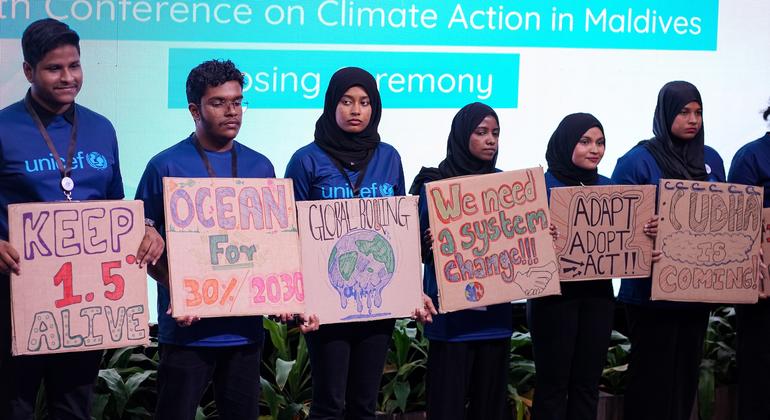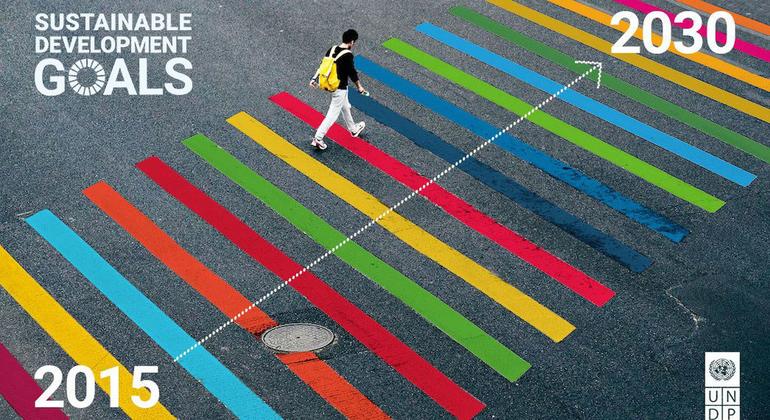
In Sierra Leone, young farmer and environmentalist Michael Nabiu (in green T-shirt, second from left) helps students promote social inclusion and sustainable development. Doha Summit: Towards a Just World Vibhu Mishra Sustainable Development Goals
How to build a society where everyone feels a part of social progress? In a world of increasing digital inequality, demographic shifts and climate disruption, the promise of “social development for all” sounds more relevant than ever, but, let’s be honest, not entirely realistic.
The idea that development should be people-centred, inclusive and equitable is not new. This vision was cemented 30 years ago at the UN summit in Copenhagen – and remains relevant today.
Next week, world leaders will gather in Doha, Qatar, for a high-level UN conference to breathe new life into this vision. From 4 to 6 November, the Second World Summit on Social Development will bring together heads of state, ministers, civil society and experts to assess progress, identify gaps and chart a renewed course.
Focus on a simple but landmark survey: How to ensure no one is left behind?
“The summit comes at a critical time,” said Li Junhua, UN Under-Secretary-General for Economic and Social Affairs. – Inequality is growing. Trust is destroyed. Communities face conflict, climate shocks and rapid technological change. At the same time, we are seeing incredible examples of innovation, sustainability and solidarity. This is our chance to restore trust between governments and peoples, and between countries.”
Global Call to Action
Björg Sandkjær, UN Assistant Secretary-General for Economic and Social Affairs, called the summit a “global call to action.” She recalled that more than a billion people in the world still live in poverty, and 40 percent of the world’s population lacks access to social protection.
This meeting, she told UN News Service, aims to restore trust in collective progress – “the belief that we can make a difference.”

The summit was the result of months of intergovernmental negotiations in New York, which culminated in the agreement on the Doha Political Declaration, which is planned to be officially adopted at the forum.
“This declaration is the soul and heart of the summit,” said Alia Ahmed Saif Al-Thani, Permanent Representative of Qatar to the UN. “This is a global call to action, reaffirming the commitment of governments to create an enabling economic, political, social, cultural and legal environment to achieve social development for all.”
Tipping Point
With just five years left until the 2030 target date for achieving the Sustainable Development Goals (SDGs), the world is seriously behind on many fronts. Poverty reduction has slowed, progress on gender equality has stalled, and many young people face an uncertain future.
When Member States called for this summit last year, they sent a clear message: social development must once again be a priority. It is about getting back to the heart of the 2030 Agenda and ensuring that no one is left behind.
A dynamic and inclusive format
In addition to the official plenary sessions, a parallel program of events has been prepared. The Civil Society Forum, Private Sector Forum and interactive Solutions Square will showcase innovations in employment, social protection and community resilience.
The Doha Social Development Solutions Platform, jointly launched by Qatar and France, will present tangible commitments and new initiatives, from policy reforms to partnerships to grow employment, expand inclusion and fight poverty.
“The Doha Forum becomes a symbol of global solidarity, where commitments inspire action, partnerships help drive progress, and a shared vision of an inclusive, sustainable and peaceful future for all is realized,” said Alia Ahmed Saif Al-Thani.

Closing the Circle
For Björg Sandkjær, who attended the first World Summit in Copenhagen in 1995 as an activist representing youth, the Doha forum symbolizes both continuity and change. Back then, she recalls, there was great optimism—a belief that multilateralism and cooperation would steadily advance.
“Today’s youth face tougher challenges—misinformation, climate threats, mistrust,” she said. “My message to young people is simple: your participation matters. Speak up, build new alliances, push for action.”
From words to action
The real test, says Björg Sandkjær, will be translating commitments into real improvements in people’s lives – decent work, social protection and greater inclusion: “That’s when we will know what we have achieved success.”
Thirty years after Copenhagen, the challenge remains the same: to build a world in which progress is measured not only by wealth, but also by well-being, equality and human dignity.
UN News Service will provide live coverage from Doha throughout the summit. The voices of political leaders, young activists, civil society representatives and innovators driving change will be heard.
